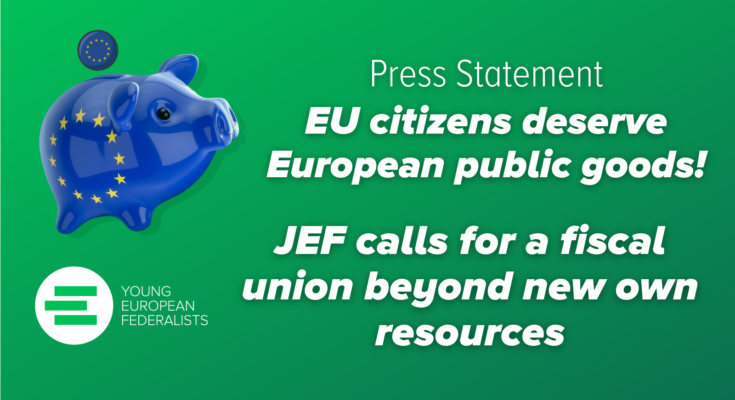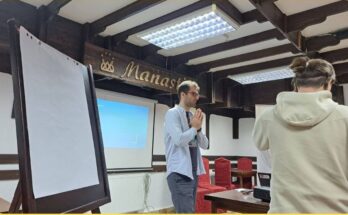Brussels , 22 December 2021
Key points:
- While the new own resources proposed by the Commission could be an important step for the EU, they remain insufficient.
- The EU needs an independent fiscal capacity to provide European public goods to its citizens, in line with the principle of subsidiarity.
“Historically, parliaments have always approved new taxes. The American Revolution started with the slogan ‘no taxation without representation’. Currently, we have EU representation without taxation – the European Parliament represents citizens but doesn’t have a fiscal capacity, which means that while it adopts policies, it cannot raise revenues to fund them”, comments Antonio Argenziano, President of JEF Europe.
Today, the European Commission has unveiled its proposal for three new revenue sources for the EU budget independent from national contributions, so-called “own resources”. The first is based on revenues from emissions trading (ETS), the second draws on the resources generated by the proposed EU carbon border adjustment mechanism, and the third is based on the share of residual profits from multinational companies that will be re-allocated to EU Member States under the recent OECD/G20 agreement on a re-allocation of taxing rights (“Pillar One”). These new own resources, estimated to generate €17 billion a year from 2026, are necessary for the EU to cover the costs of the €800 billion economic recovery and transformation package Next Generation EU (NGEU). The new own resources should also finance the Social Climate Fund.
Now this proposal has to pass first through the – formal or informal – veto mechanism of the Council and then the ratification by every member state. This process will take time and the risk of a watered-down compromise is high. The global challenges we are facing, such as climate and digital transitions and social issues, are urgent and need ambitious answers. That’s why complementing the Economic and Monetary Union with the missing fiscal pillar is a necessary next step in European integration. Certainly, it will finally allow the EU to fund its own policies independently from national governments and provide the necessary European public goods to its citizens. In order to ensure a democratic oversight, the European Parliament should be fully involved in introducing, developing and monitoring these fiscal instruments without being dependent on cumbersome national ratification processes.
Subsidiarity and cost-effectiveness must be the guiding principles while building a Fiscal Union. New taxes should not become an additional burden to individual citizens; rather, the entire tax system must be redesigned to ensure that European, national and local authorities collect revenues for implementing the tasks done best at their respective levels. For instance, there is no need to collect certain taxes for climate action at the national level when the EU is a more suitable actor to address the climate crisis and needs adequate resources for this effort.
Currently, some 70% of EU budget revenues come from the member states based on their Gross National Income (GNI). This renders EU funds dependent on their changing economic situation and political will. Every seven years, the member states decide on the EU’s long-term budget, often prioritising their narrowly-defined interests over the common good of all Europeans, including by using their veto. Despite representing the interest of EU citizens directly, the European Parliament can only approve or reject this long-term EU budget.
“With fiscal power exercised by the European Parliament, the EU will be able to provide genuine European public goods to its citizens, such as a clean environment, digital security, a better response to pandemics or the implementation of the social pillar. We need a democratic Fiscal Union based on own resources to make the EU budget work for Europeans!” concludes Argenziano.
About JEF Europe
The Young European Federalists (JEF Europe) is a political youth NGO advocating for the creation of a democratic European federation as a guarantee for peace, the rule of law and human rights. JEF Europe promotes true European citizenship, works for the widening and deepening of the European Union and strives for a more just and integrated society on the European continent. Established in 1972, the organisation has more than 10,000 activists organised in over 250 national, regional and local sections in 31 countries. The ideals and aims of JEF Europe are defined in the Manifesto of Ventotene, the Political Platform and resolutions adopted by its statutory bodies.
Previous positions on European economic integration
- 2021.09.15 Press statement: Many steps but in what direction? Europe needs a fresh vision for an Ever Closer Union
- 2020.09.12 Press statement: JEF Europe calls for an ambitious agreement on own resources for the EU
- JEF Europe CoFoE proposal: Making the EU budget work for Europeans – a Fiscal Union
Contact information
Antonio Argenziano, President
Young European Federalists
Rue d’Arlon 53, 1040 Brussels
antonio.argenziano@jef.eu





